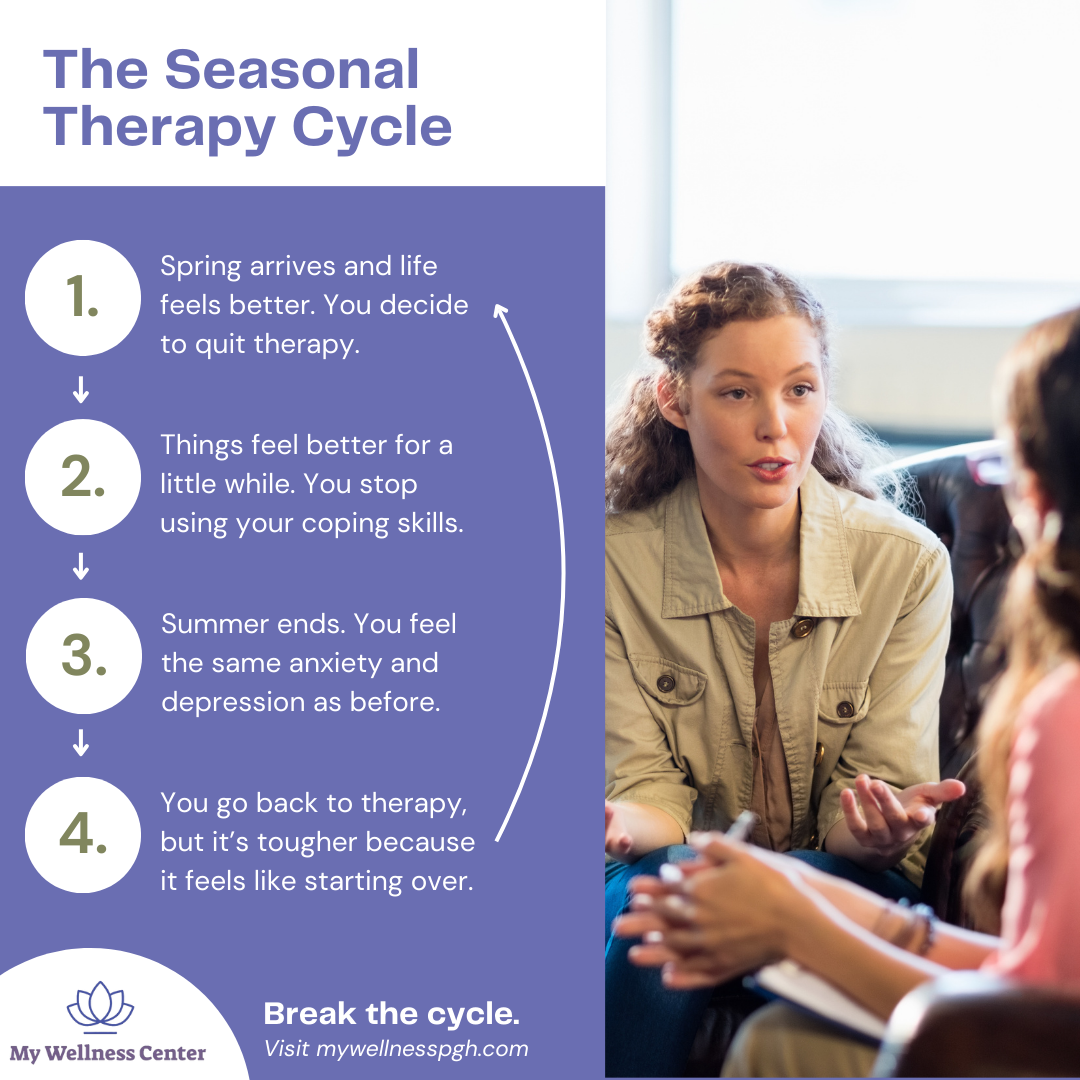Spring is in the air! And while that means blooming flowers, bright skies, and sunny days ahead, it also means we’ll likely see numerous clients decide to scale back on therapy.
It happens every year: The weather gets nice, people start feeling better emotionally and mentally, and they decide to skip therapy and even stop taking their medication.
By August, the therapy industry as a whole feels the “summer slump”—a period where it seems like our therapy calendar is open because so many people decided to call off.
But here’s the problem: Eventually, summer vacation ends. The gray clouds of fall set in, the days get shorter, and the air gets cold. And with all of that comes renewed feelings of depression, anxiety, and other emotional and mental issues.
And, suddenly, our offices are filled with people trying to get back on track.
It’s much better to stay consistent!

Determining Whether You Should Stop Therapy and Medication
If you’re wondering whether you’re in a good spot to stop therapy or taking your medication, keep reading to learn more!
When to Stop Therapy
For many of our patients, therapy isn’t forever. Especially for people who are receiving sessions like Grief Therapy Services or Postpartum Depression Counseling, therapy could be a very temporary tool for overcoming emotional challenges in your life.
In other cases, therapy might be an ongoing resource. Individuals receiving Anxiety Therapy or Trauma Therapy may simply require more time to process their thoughts and emotions and develop the skills necessary to move them beyond their biggest challenges.
So, when should you stop therapy?
You should stop therapy when you and your therapist both feel like you’ve made sufficient progress to discontinue your sessions. And, as we’ll discuss later, your therapist may also recommend gradually reducing your sessions instead of discontinuing them altogether.
When to Stop Your Medication
My Wellness Center is not a health clinic with the ability to prescribe medication, so all decisions regarding medication should be determined with the help of a medical professional, especially the individual who wrote the prescription.
While the need for some medications is temporary—much like therapy—suddenly discontinuing medication without the supervision of a medical professional could cause more harm than good. Always consult with your doctor before altering your dosage, changing medications, or discontinuing medication altogether.
Transitioning Into Mental Health ‘Maintenance’: When And How to Scale Back On Therapy and Medication
We rarely recommend cutting out therapy and medication all at once. Instead, for individuals who’ve made good progress with therapy and medication, we recommend a “maintenance” phase where they gradually reduce their therapy visits.
Maybe they move from therapy once a week to every other week, or every other week to once a month, or once a month to every six weeks.
The idea is to gradually reduce the frequency of therapy sessions to gauge progress outside of therapy without eliminating therapy altogether.
If gradually reducing therapy seems to work well, you and your therapist can then discuss completely pausing your sessions.
Medication is different. As we mentioned earlier, our team at My Wellness Center will never outright recommend stopping a medication your medication provider has prescribed.
While some of our patients do see success in gradually reducing their medication dosage, this is a decision that should be made under the guidance and recommendation of your healthcare professional.
Hurdles to Coming Back to Therapy
When people stop therapy cold turkey, they often face challenges when trying to come back. A few reasons:
- Shame. Many of our patients who suddenly stop therapy and eventually come back are embarrassed about the lack of communication and the idea that they might have insulted the therapist.
- They’re afraid they’ve let the therapist down. By stopping sessions, they’ve also stopped working on themselves, and some clients feel like they’ve lost some of the respect and the relationship they’ve built with the therapist.
- They’re afraid of starting over. Once they return to therapy, it can take a few sessions to recapture the momentum they’d previously established.
- They’re starting over. If someone has suddenly stopped therapy, they may have also felt like they’ve been spiraling into depression, having outbursts, or failing to practice their coping skills.
If you’re struggling to return to therapy after a pause, know this: You belong. It’s perfectly OK to come back. In fact, it’ll ultimately be beneficial for you.
Schedule Your Next Therapy Session
If you’re worried about discontinuing therapy or starting again, contact us. We’ll provide a no-pressure consultation to help you determine what’s best for you.

